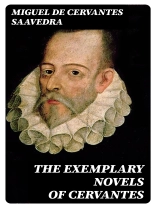In ‘The Exemplary Novels of Cervantes, ‘ Miguel de Cervantes presents a collection of twelve novellas that reflect the complexity of human experience and societal norms of early 17th-century Spain. Employing a rich, narrative style that blends realism with elements of the fantastic, Cervantes crafts stories rife with moral dilemmas, social critiques, and poignant characterizations. Each story operates within a framework of courtly love, deception, and the pursuit of ideals, often highlighting themes of honor and betrayal, while disrupting established forms of storytelling prevalent during the Spanish Golden Age. Miguel de Cervantes Saavedra, a seminal figure in world literature, draws heavily from his own tumultuous life experiences—ranging from naval battles to imprisonment—to inform the diverse characters and narratives of these exemplary novels. His keen observations on the human condition reveal a deep empathy and understanding of the social landscape of his time, marking him as a precursor to modern novelists and a master of psychological depth. This collection is a must-read for anyone interested in the origins of the modern novel and the complexities of human nature. Cervantes masterfully intertwines humor and pathos, inviting readers to question societal conventions while engaging with his timeless tales, ensuring that ‘The Exemplary Novels’ remains a profound exploration of life that resonates across generations.
Про автора
Miguel de Cervantes Saavedra (1547-1616), widely regarded as the preeminent figure in Spanish literature, is best known for his magnum opus, ‘Don Quixote’, often considered the first modern novel. However, his literary repertoire extends beyond this classic, encompassing a collection of short stories titled ‘The Exemplary Novels of Cervantes’ (Novelas ejemplares), which further cemented his reputation. Born in Alcalá de Henares, Spain, Cervantes led a tumultuous life that included military service, captivity in Algiers, and various financial struggles. Despite these hardships, his literary work offers a profound exploration of the human condition, characterized by a blend of realism, satire, and psychological insight. The ‘Exemplary Novels’, written between 1590 and 1612, showcase Cervantes’s narrative versatility, ranging from comedic romps to moralistic tales, all of which exhibit his trademark irony and moral wisdom. The influence of these stories on the Western literary canon is undeniable, as they reflect his innovative use of language and profound understanding of human nature. Cervantes’s style, marked by a skillful play with literary forms and a keen sense of social critique, has earned him a timeless legacy as a master storyteller and a central figure in the evolution of the novel as a literary genre.












